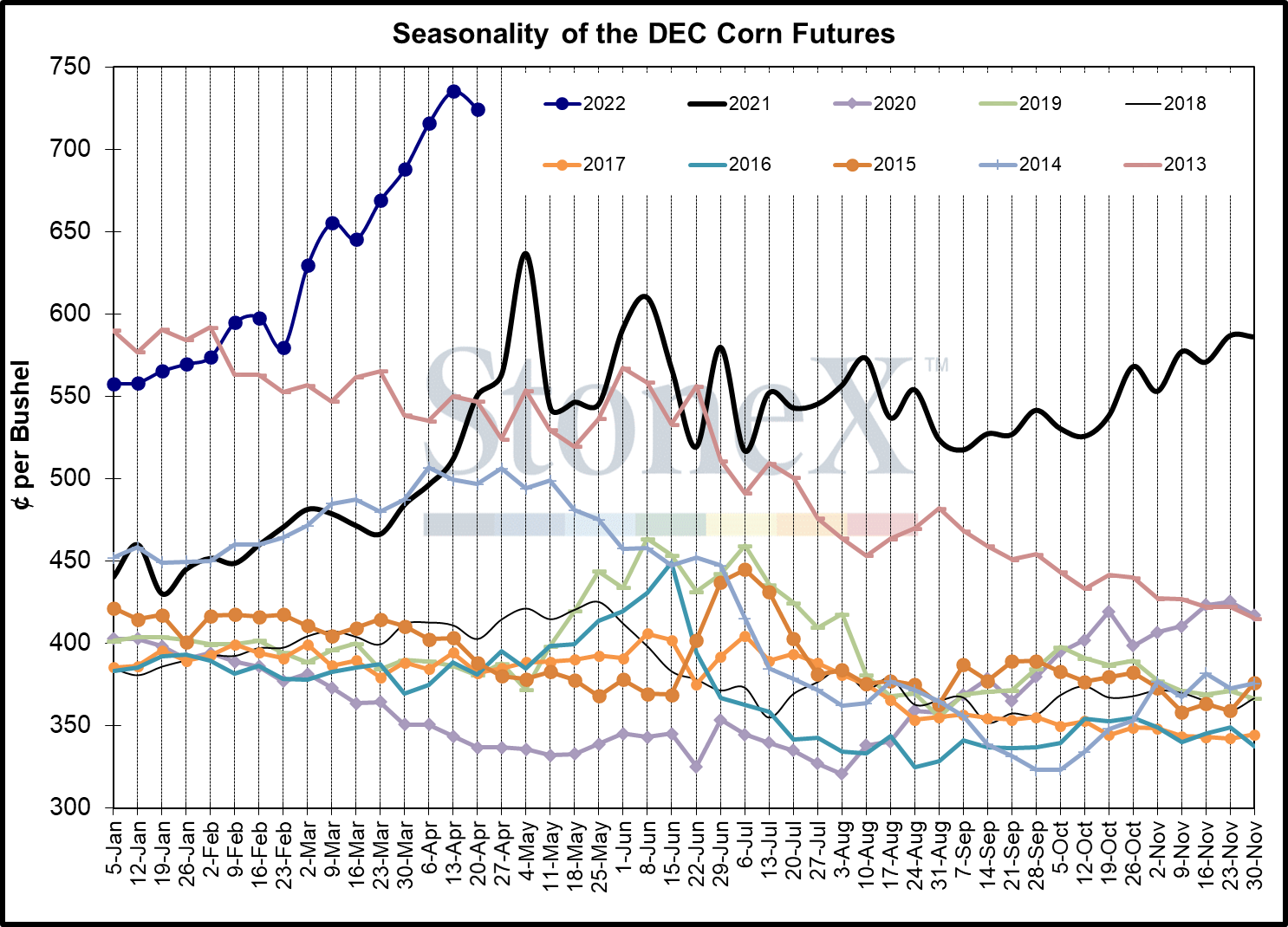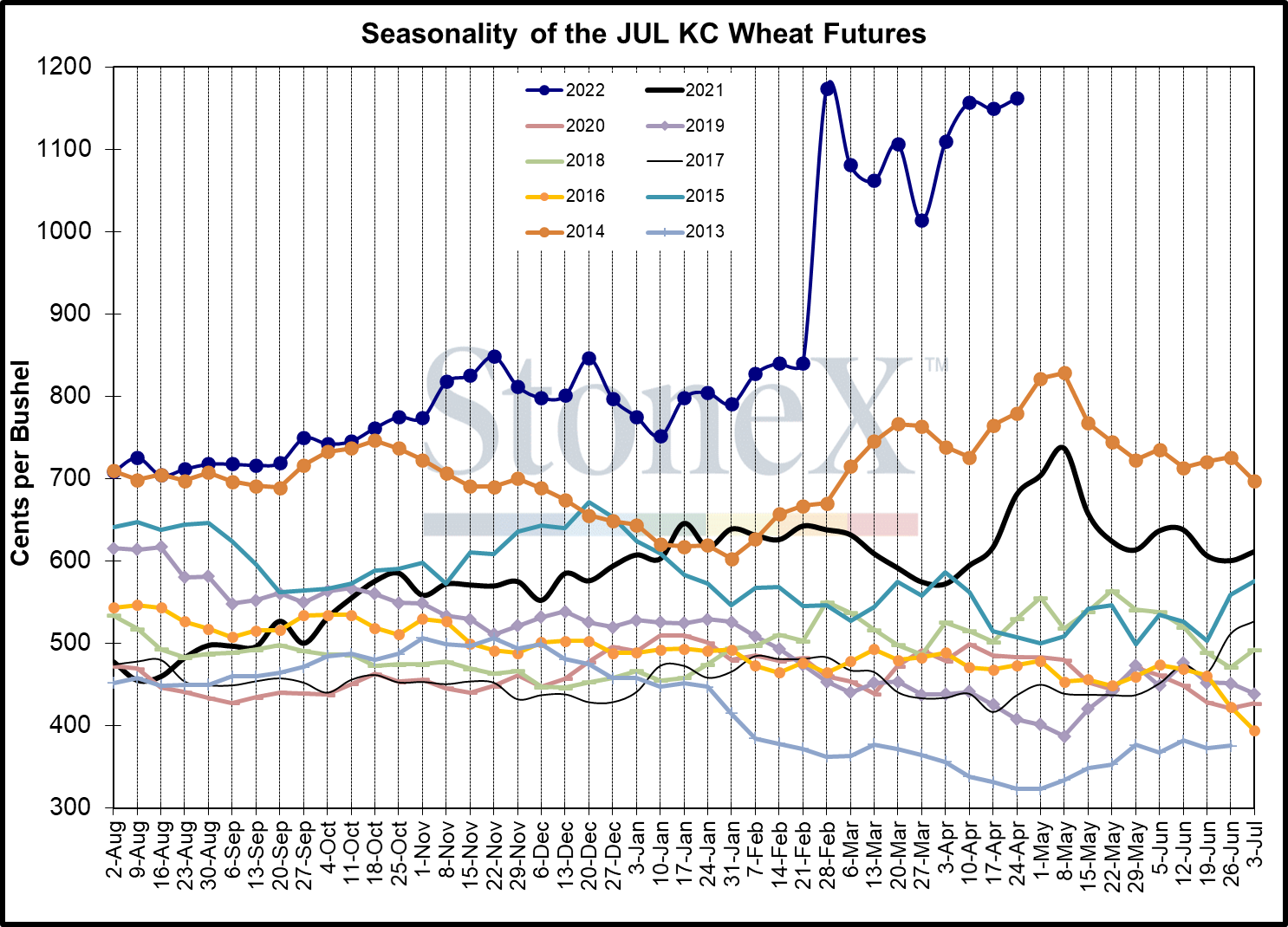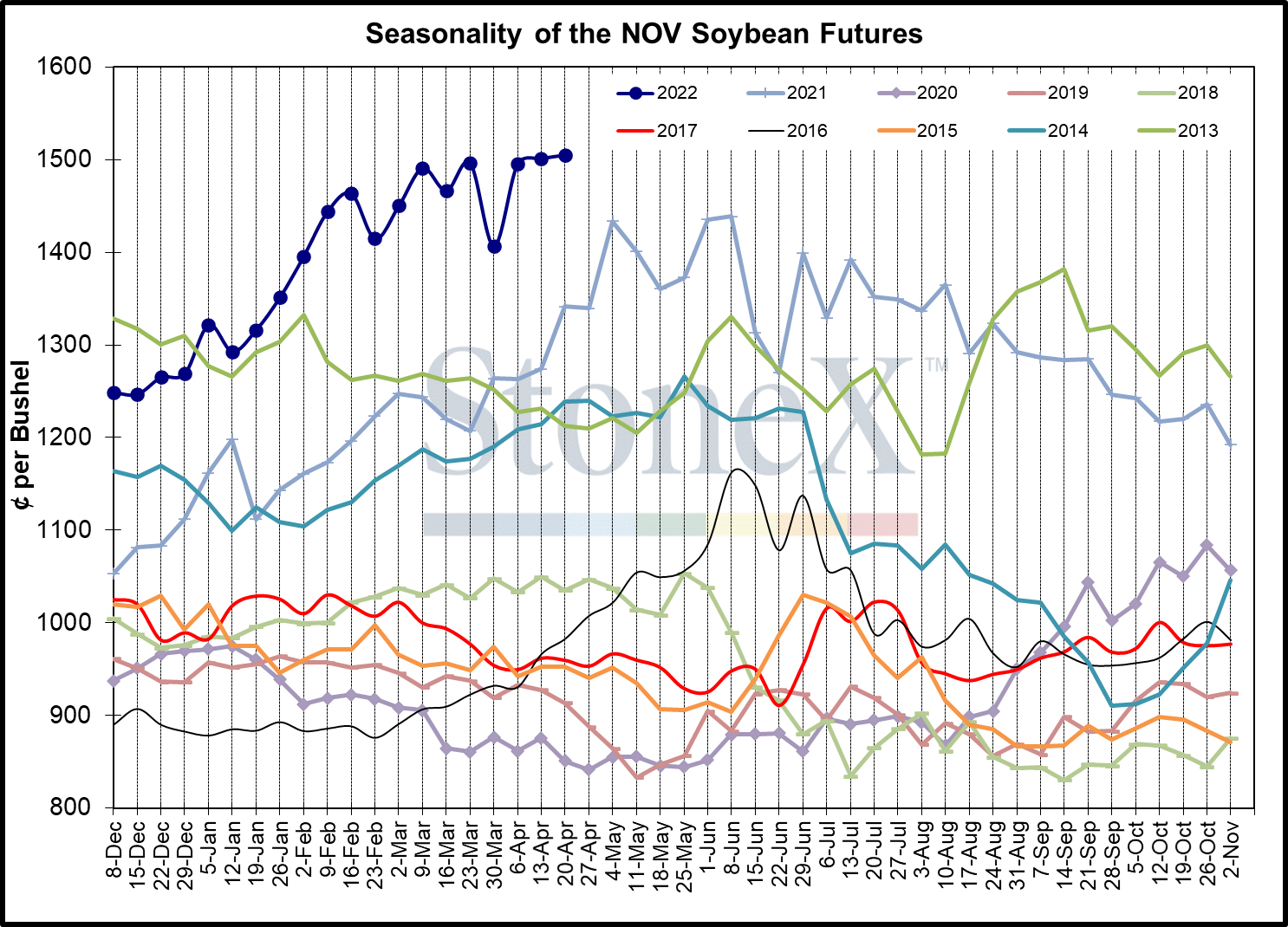Forward Thinking_June 2022
Jun 10, 2022

By Cindy Warner, Grain Originator - Ulysses Area
Chart courtesy of Stone X
Grain marketing, it’s tough. So many factors play into the pricing of a farmer’s crop. Factors like input costs, energy costs, freight costs, irrigation costs (or lack thereof), and emotion. Added to farmer factors, the market factors can add to the stress of grain pricing; things like exports, war, inflation, politics, weather, time, and the list goes on and on. So, what does the producer do? 1. Market with a foundation of historic pricing charts to help capture timing. 2. Study current events and the possible future effects on the commodities market. 3. Forward contract to mitigate downside risk.
Historically, forward selling a percentage of grain is the best marketing practice roughly 80% of the time. There are outlier years that can be a pain to market (like 2012 and 2021), but the average across 10 years of a forward-marketer versus an across-the-scale marketer tend to be more favorable.
The charts below show the seasonality of December corn, July Kansas City wheat, and November beans. Favorable time to forward price corn is historically May through July-Aug, with outlier years being Aug to Nov. Wheat looks favorable about a year out, so as harvest starts for wheat, it is also a great time to think about next year’s wheat marketing. Soybean marketing looks to be favorable about the same time as corn, in that May-Aug time frame.
Garden City Co-op offers many options to price the producer’s crop early, and often. GCC offers contracts for the farmers that like to price a little more “vanilla” and set the price in part or as a whole, as well as contracts for the farmers that like to take on a little extra cost/risk for the sake of opportunity.
Basis Contracts
Basis contracts allow the producer to set the basis now and wait on locking in the futures. The contract is set on a certain number of bushels of grain in 5,000-bushel increments. A basis contract is unpriced because while basis is locked in, futures are not set. Storage does not stop with a basis contract until the futures are set and the contract becomes fully priced. Seller holds futures risk, as well as production and performance risk.
Hedge To Arrive (HTA) Contracts
Hedge to Arrive, or HTA, allows the futures to be set on a certain number of bushels of grain yet to be delivered, in 1,000-bushel increments. A HTA contract is unpriced because while futures are locked in, basis is not set. Storage does not stop with a HTA contract until the basis is set and the contract becomes fully priced. Seller holds basis risk, as well as production and performance risk.
Forward Priced Contracts
A forward priced contract is made when the futures and basis are set on a certain number of bushels of grain yet to be delivered, in 1,000-bushel increments. Storage stops the day the contract is made on only the number of bushels contracted. Seller holds no price risk except in the form of lost opportunity but does hold production/performance risk.
Specialty Contracts
Garden City Co-op offers many specialty contracts such as minimum price contracts, accumulator contracts, and averaging contracts. While these contracts can offer opportunity to potentially capture market upside, there is elevated cost and risk associated with specialty contracts. Contact a local grain originator for more information for any interest in specialty contracts.
While marketing can be tough (especially in today’s market), Garden City Co-op offers many options to mitigate downside price risk to help lock in margin for the farm. Contact a local Garden City Co-op Grain Originator for information today!
Chart courtesy of Stone X
Grain marketing, it’s tough. So many factors play into the pricing of a farmer’s crop. Factors like input costs, energy costs, freight costs, irrigation costs (or lack thereof), and emotion. Added to farmer factors, the market factors can add to the stress of grain pricing; things like exports, war, inflation, politics, weather, time, and the list goes on and on. So, what does the producer do? 1. Market with a foundation of historic pricing charts to help capture timing. 2. Study current events and the possible future effects on the commodities market. 3. Forward contract to mitigate downside risk.
Historically, forward selling a percentage of grain is the best marketing practice roughly 80% of the time. There are outlier years that can be a pain to market (like 2012 and 2021), but the average across 10 years of a forward-marketer versus an across-the-scale marketer tend to be more favorable.
The charts below show the seasonality of December corn, July Kansas City wheat, and November beans. Favorable time to forward price corn is historically May through July-Aug, with outlier years being Aug to Nov. Wheat looks favorable about a year out, so as harvest starts for wheat, it is also a great time to think about next year’s wheat marketing. Soybean marketing looks to be favorable about the same time as corn, in that May-Aug time frame.
 |
 |
 |
Garden City Co-op offers many options to price the producer’s crop early, and often. GCC offers contracts for the farmers that like to price a little more “vanilla” and set the price in part or as a whole, as well as contracts for the farmers that like to take on a little extra cost/risk for the sake of opportunity.
Basis Contracts
Basis contracts allow the producer to set the basis now and wait on locking in the futures. The contract is set on a certain number of bushels of grain in 5,000-bushel increments. A basis contract is unpriced because while basis is locked in, futures are not set. Storage does not stop with a basis contract until the futures are set and the contract becomes fully priced. Seller holds futures risk, as well as production and performance risk.
Hedge To Arrive (HTA) Contracts
Hedge to Arrive, or HTA, allows the futures to be set on a certain number of bushels of grain yet to be delivered, in 1,000-bushel increments. A HTA contract is unpriced because while futures are locked in, basis is not set. Storage does not stop with a HTA contract until the basis is set and the contract becomes fully priced. Seller holds basis risk, as well as production and performance risk.
Forward Priced Contracts
A forward priced contract is made when the futures and basis are set on a certain number of bushels of grain yet to be delivered, in 1,000-bushel increments. Storage stops the day the contract is made on only the number of bushels contracted. Seller holds no price risk except in the form of lost opportunity but does hold production/performance risk.
Specialty Contracts
Garden City Co-op offers many specialty contracts such as minimum price contracts, accumulator contracts, and averaging contracts. While these contracts can offer opportunity to potentially capture market upside, there is elevated cost and risk associated with specialty contracts. Contact a local grain originator for more information for any interest in specialty contracts.
While marketing can be tough (especially in today’s market), Garden City Co-op offers many options to mitigate downside price risk to help lock in margin for the farm. Contact a local Garden City Co-op Grain Originator for information today!